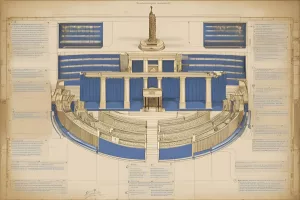South African group AfriForum has taken legal action opposing the appointment of deposed judge John Hlophe to the Judicial Service Commission (JSC), arguing that it breaches the National Assembly’s constitutional duty and risks the judiciary’s reputation and independence. Hlophe was found guilty of serious judicial misconduct in 2021 and dismissed by President Cyril Ramaphosa. AfriForum’s CEO Kallie Kriel stated that it was “inconceivable” that someone previously regarded as unfit to serve as a judge could evaluate the morals and competence of prospective judges.
Experience the vibrant heartbeat of democracy in South Africa’s National Assembly, where diverse voices come together to forge crucial budgetary choices through a dynamic confluence of diplomacy and negotiation. With a commitment to inclusivity and transparency, the Assembly invites media participation and digital outreach to sustain the transparency essential for strong democracies. Witness the intricate ballet of democracy and explore the archives to understand South Africa’s enduring commitment to inclusive policymaking and legislative history.
Newly Elected Chairpersons in National Assembly Committees: A Fresh Direction for Parliament
Newly elected chairpersons in the National Assembly committees bring a fresh direction to parliament. They oversee the administration of their respective committees and transform decisions into reports. Public meetings held by these committees allow ordinary South Africans to express their views and influence parliamentary decisions. Recently, 30 portfolio committees have been established, and sixteen portfolio committees held elections for chairpersons, including representatives for health, finance, and communication and technologies. Members of the public can attend debates or arrange a tour to witness democracy in action.
The National Assembly’s Rules Committee is an essential part of the legislative process in South Africa, shaping policy and guiding procedure. Its decisions can affect the government’s operation and its interaction with the Assembly. The media’s coverage of the committee’s meetings ensures that the legislative process remains fully democratic and participatory. The committee’s recent gathering in 2024 was a crucial discussion that determined the future of South Africa’s legislative proceedings, and media coverage was extensive to make the process accessible to everyone.
South Africa’s National Assembly is establishing a new parliamentary structure for its seventh term, focusing on creating a diverse and inclusive representation. The Programme Committee, responsible for determining the House’s agenda, and the Subcommittee on Review of NA Rules, ensuring the Assembly’s rules and practices’ integrity, are key players in this endeavor. The Rules Committee is developing new rules and procedures, with a comprehensive rulebook serving as the foundation of the NA’s operation. With the Chamber holding historical and symbolic importance, the National Assembly is wellprepared to lay a robust foundation for an effective parliament.
Ms. Nosiviwe MapisaNqakula resigned as the Speaker of the National Assembly and a Member of Parliament due to her strong belief in the credibility and responsibilities of Parliament and the laws of South Africa. Her resignation has caused a significant shakeup in South African parliamentary politics and sparked much analysis and conversation. Understanding the role of the Speaker in the legislative process is crucial in appreciating the weight of her resignation. Despite the transition, the Parliament remains dedicated to the service of the South African people and the preservation of the country’s legal structure.
In a historic decision, Judges John Hlophe and Nkola Motata were dismissed from their judicial roles in South Africa due to gross misconduct. The decision was made by the National Assembly following the Judicial Service Commission’s findings. The dismissal showcases South Africa’s commitment to upholding justice and highlights the accountability mechanisms within the country’s judiciary. The process leading to the decision was lengthy and involved various bodies, demonstrating the regulation and rule of law in the country.
The Western Cape High Court has rejected Judge John Hlophe’s request to halt the National Assembly’s proceedings for his dismissal, marking a critical moment in the feud between legislative power and judicial autonomy in South Africa. Hlophe had argued that the Assembly’s proceedings went against the principle of separation of powers and did not meet constitutional standards. However, the court upheld the Assembly’s responsibility to execute its duties and the importance of avoiding interference in constitutional processes. The ruling serves as a reminder of democracy’s ongoing nature and the need for active participation from all sectors of society.
On May 19, 2023, Minister in the Presidency, Ms. Khumbudzo Ntshavheni, will present the budget policy statement for the State Security Agency (SSA) to the National Assembly of Parliament in Committee Room S12A. This event will showcase the progress made by the SSA in the previous financial year and outline its targets for the 2023/24 financial year.









